Critical Analysis: Jeremy Corbyn's Brexit Speech at Wakefield
VerifiedAdded on 2023/04/19
|7
|2524
|485
Essay
AI Summary
This essay analyzes Jeremy Corbyn's speech delivered in Wakefield on January 10, 2019, focusing on Brexit. The speech outlines the Labour Party's vision for navigating the Brexit crisis, criticizing the Conservative government's handling of the situation and their perceived alignment with elite interests. Corbyn emphasizes the need for a customs union with the EU, a strong Labour government to protect workers' rights, and investment in local hi-tech industries. He addresses concerns of both Leave and Remain voters, as well as EU residents in Britain, assuring them of Labour's commitment to inclusivity and improved living standards. The speech promotes collectivist ideas, advocating for public institutions and collective problem-solving, while also acknowledging the importance of British entrepreneurship. Corbyn argues that a general election would provide the best platform for uniting the country and implementing Labour's plan for a more equitable and prosperous future.
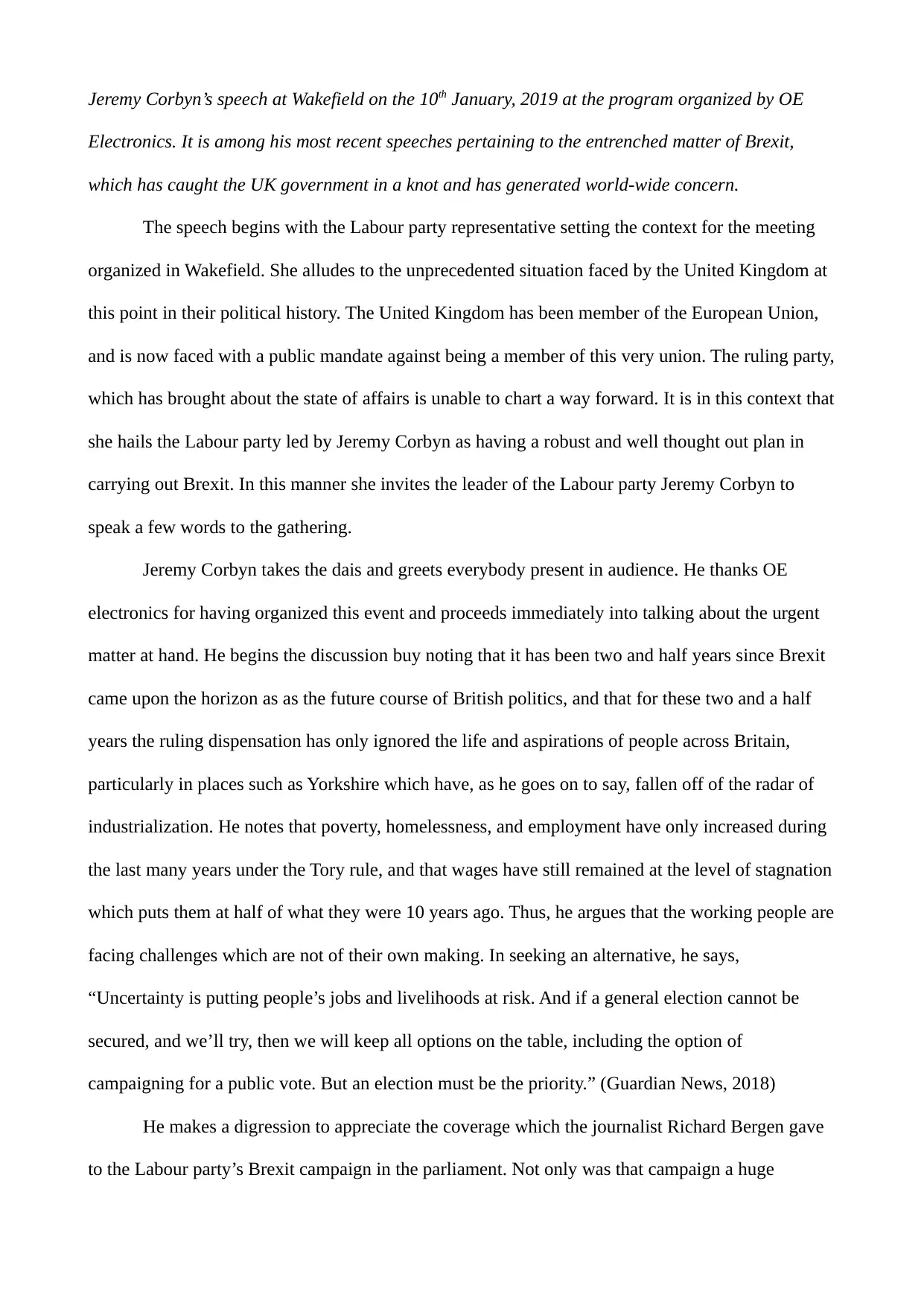
Jeremy Corbyn’s speech at Wakefield on the 10th January, 2019 at the program organized by OE
Electronics. It is among his most recent speeches pertaining to the entrenched matter of Brexit,
which has caught the UK government in a knot and has generated world-wide concern.
The speech begins with the Labour party representative setting the context for the meeting
organized in Wakefield. She alludes to the unprecedented situation faced by the United Kingdom at
this point in their political history. The United Kingdom has been member of the European Union,
and is now faced with a public mandate against being a member of this very union. The ruling party,
which has brought about the state of affairs is unable to chart a way forward. It is in this context that
she hails the Labour party led by Jeremy Corbyn as having a robust and well thought out plan in
carrying out Brexit. In this manner she invites the leader of the Labour party Jeremy Corbyn to
speak a few words to the gathering.
Jeremy Corbyn takes the dais and greets everybody present in audience. He thanks OE
electronics for having organized this event and proceeds immediately into talking about the urgent
matter at hand. He begins the discussion buy noting that it has been two and half years since Brexit
came upon the horizon as as the future course of British politics, and that for these two and a half
years the ruling dispensation has only ignored the life and aspirations of people across Britain,
particularly in places such as Yorkshire which have, as he goes on to say, fallen off of the radar of
industrialization. He notes that poverty, homelessness, and employment have only increased during
the last many years under the Tory rule, and that wages have still remained at the level of stagnation
which puts them at half of what they were 10 years ago. Thus, he argues that the working people are
facing challenges which are not of their own making. In seeking an alternative, he says,
“Uncertainty is putting people’s jobs and livelihoods at risk. And if a general election cannot be
secured, and we’ll try, then we will keep all options on the table, including the option of
campaigning for a public vote. But an election must be the priority.” (Guardian News, 2018)
He makes a digression to appreciate the coverage which the journalist Richard Bergen gave
to the Labour party’s Brexit campaign in the parliament. Not only was that campaign a huge
Electronics. It is among his most recent speeches pertaining to the entrenched matter of Brexit,
which has caught the UK government in a knot and has generated world-wide concern.
The speech begins with the Labour party representative setting the context for the meeting
organized in Wakefield. She alludes to the unprecedented situation faced by the United Kingdom at
this point in their political history. The United Kingdom has been member of the European Union,
and is now faced with a public mandate against being a member of this very union. The ruling party,
which has brought about the state of affairs is unable to chart a way forward. It is in this context that
she hails the Labour party led by Jeremy Corbyn as having a robust and well thought out plan in
carrying out Brexit. In this manner she invites the leader of the Labour party Jeremy Corbyn to
speak a few words to the gathering.
Jeremy Corbyn takes the dais and greets everybody present in audience. He thanks OE
electronics for having organized this event and proceeds immediately into talking about the urgent
matter at hand. He begins the discussion buy noting that it has been two and half years since Brexit
came upon the horizon as as the future course of British politics, and that for these two and a half
years the ruling dispensation has only ignored the life and aspirations of people across Britain,
particularly in places such as Yorkshire which have, as he goes on to say, fallen off of the radar of
industrialization. He notes that poverty, homelessness, and employment have only increased during
the last many years under the Tory rule, and that wages have still remained at the level of stagnation
which puts them at half of what they were 10 years ago. Thus, he argues that the working people are
facing challenges which are not of their own making. In seeking an alternative, he says,
“Uncertainty is putting people’s jobs and livelihoods at risk. And if a general election cannot be
secured, and we’ll try, then we will keep all options on the table, including the option of
campaigning for a public vote. But an election must be the priority.” (Guardian News, 2018)
He makes a digression to appreciate the coverage which the journalist Richard Bergen gave
to the Labour party’s Brexit campaign in the parliament. Not only was that campaign a huge
Paraphrase This Document
Need a fresh take? Get an instant paraphrase of this document with our AI Paraphraser
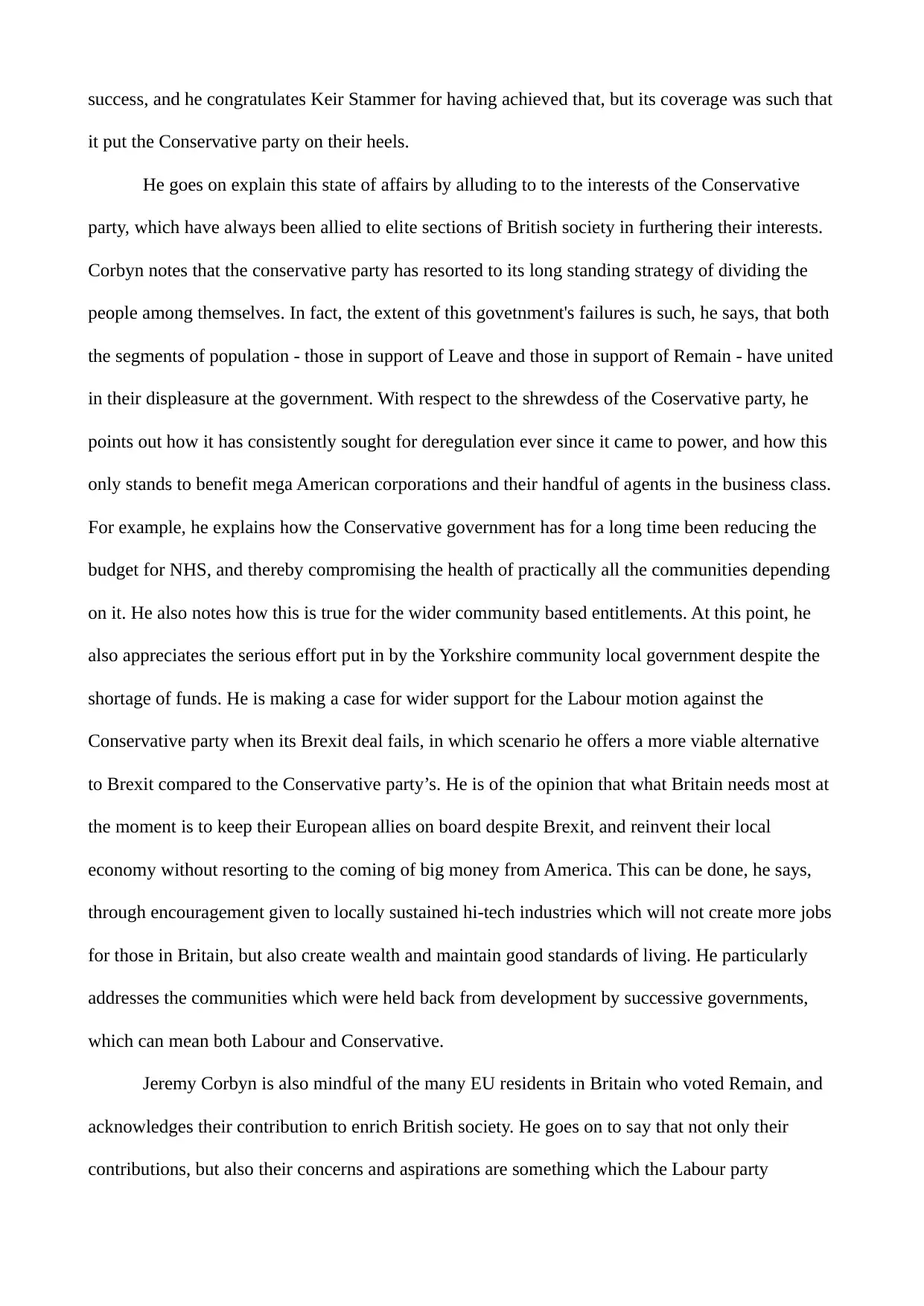
success, and he congratulates Keir Stammer for having achieved that, but its coverage was such that
it put the Conservative party on their heels.
He goes on explain this state of affairs by alluding to to the interests of the Conservative
party, which have always been allied to elite sections of British society in furthering their interests.
Corbyn notes that the conservative party has resorted to its long standing strategy of dividing the
people among themselves. In fact, the extent of this govetnment's failures is such, he says, that both
the segments of population - those in support of Leave and those in support of Remain - have united
in their displeasure at the government. With respect to the shrewdess of the Coservative party, he
points out how it has consistently sought for deregulation ever since it came to power, and how this
only stands to benefit mega American corporations and their handful of agents in the business class.
For example, he explains how the Conservative government has for a long time been reducing the
budget for NHS, and thereby compromising the health of practically all the communities depending
on it. He also notes how this is true for the wider community based entitlements. At this point, he
also appreciates the serious effort put in by the Yorkshire community local government despite the
shortage of funds. He is making a case for wider support for the Labour motion against the
Conservative party when its Brexit deal fails, in which scenario he offers a more viable alternative
to Brexit compared to the Conservative party’s. He is of the opinion that what Britain needs most at
the moment is to keep their European allies on board despite Brexit, and reinvent their local
economy without resorting to the coming of big money from America. This can be done, he says,
through encouragement given to locally sustained hi-tech industries which will not create more jobs
for those in Britain, but also create wealth and maintain good standards of living. He particularly
addresses the communities which were held back from development by successive governments,
which can mean both Labour and Conservative.
Jeremy Corbyn is also mindful of the many EU residents in Britain who voted Remain, and
acknowledges their contribution to enrich British society. He goes on to say that not only their
contributions, but also their concerns and aspirations are something which the Labour party
it put the Conservative party on their heels.
He goes on explain this state of affairs by alluding to to the interests of the Conservative
party, which have always been allied to elite sections of British society in furthering their interests.
Corbyn notes that the conservative party has resorted to its long standing strategy of dividing the
people among themselves. In fact, the extent of this govetnment's failures is such, he says, that both
the segments of population - those in support of Leave and those in support of Remain - have united
in their displeasure at the government. With respect to the shrewdess of the Coservative party, he
points out how it has consistently sought for deregulation ever since it came to power, and how this
only stands to benefit mega American corporations and their handful of agents in the business class.
For example, he explains how the Conservative government has for a long time been reducing the
budget for NHS, and thereby compromising the health of practically all the communities depending
on it. He also notes how this is true for the wider community based entitlements. At this point, he
also appreciates the serious effort put in by the Yorkshire community local government despite the
shortage of funds. He is making a case for wider support for the Labour motion against the
Conservative party when its Brexit deal fails, in which scenario he offers a more viable alternative
to Brexit compared to the Conservative party’s. He is of the opinion that what Britain needs most at
the moment is to keep their European allies on board despite Brexit, and reinvent their local
economy without resorting to the coming of big money from America. This can be done, he says,
through encouragement given to locally sustained hi-tech industries which will not create more jobs
for those in Britain, but also create wealth and maintain good standards of living. He particularly
addresses the communities which were held back from development by successive governments,
which can mean both Labour and Conservative.
Jeremy Corbyn is also mindful of the many EU residents in Britain who voted Remain, and
acknowledges their contribution to enrich British society. He goes on to say that not only their
contributions, but also their concerns and aspirations are something which the Labour party
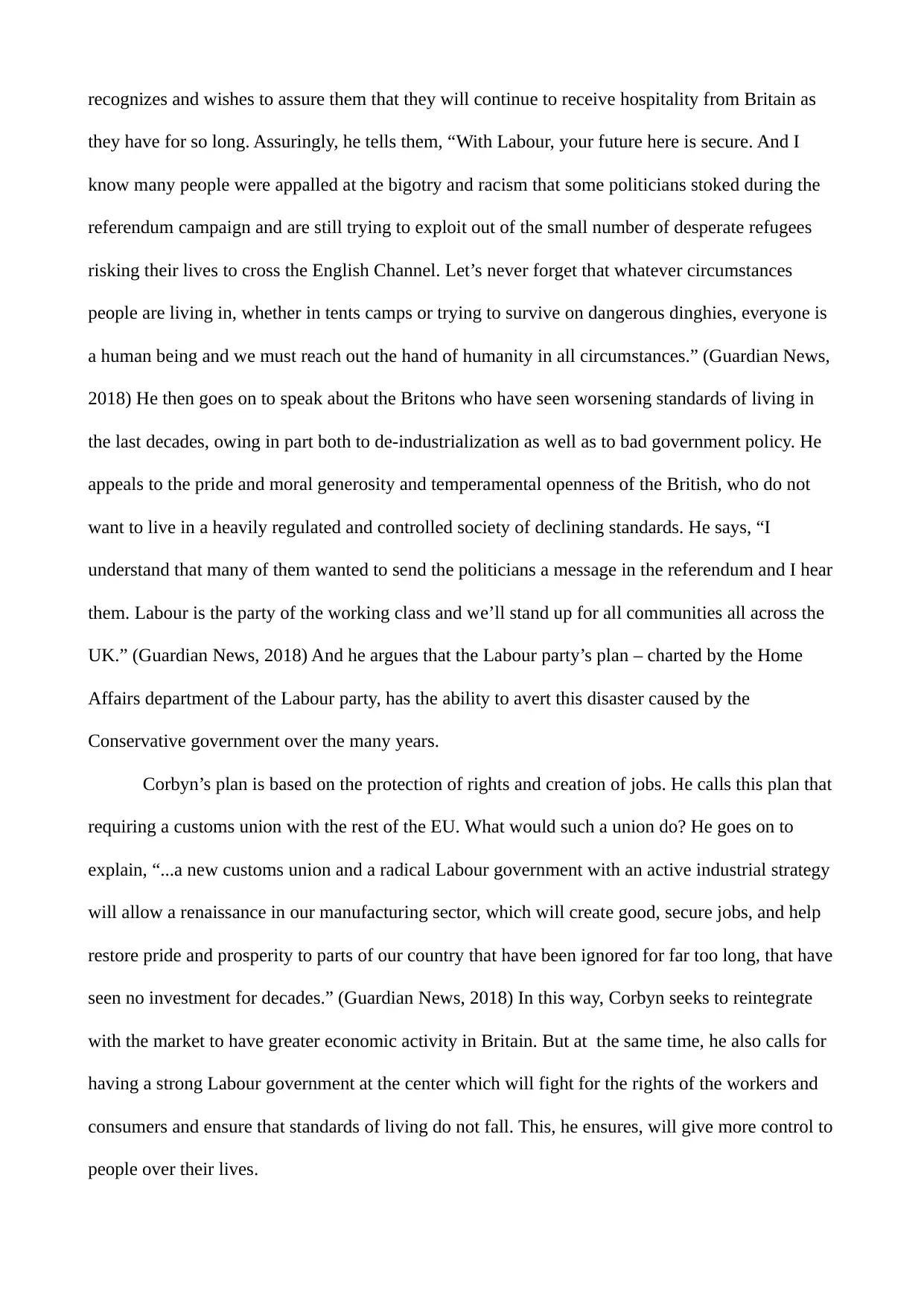
recognizes and wishes to assure them that they will continue to receive hospitality from Britain as
they have for so long. Assuringly, he tells them, “With Labour, your future here is secure. And I
know many people were appalled at the bigotry and racism that some politicians stoked during the
referendum campaign and are still trying to exploit out of the small number of desperate refugees
risking their lives to cross the English Channel. Let’s never forget that whatever circumstances
people are living in, whether in tents camps or trying to survive on dangerous dinghies, everyone is
a human being and we must reach out the hand of humanity in all circumstances.” (Guardian News,
2018) He then goes on to speak about the Britons who have seen worsening standards of living in
the last decades, owing in part both to de-industrialization as well as to bad government policy. He
appeals to the pride and moral generosity and temperamental openness of the British, who do not
want to live in a heavily regulated and controlled society of declining standards. He says, “I
understand that many of them wanted to send the politicians a message in the referendum and I hear
them. Labour is the party of the working class and we’ll stand up for all communities all across the
UK.” (Guardian News, 2018) And he argues that the Labour party’s plan – charted by the Home
Affairs department of the Labour party, has the ability to avert this disaster caused by the
Conservative government over the many years.
Corbyn’s plan is based on the protection of rights and creation of jobs. He calls this plan that
requiring a customs union with the rest of the EU. What would such a union do? He goes on to
explain, “...a new customs union and a radical Labour government with an active industrial strategy
will allow a renaissance in our manufacturing sector, which will create good, secure jobs, and help
restore pride and prosperity to parts of our country that have been ignored for far too long, that have
seen no investment for decades.” (Guardian News, 2018) In this way, Corbyn seeks to reintegrate
with the market to have greater economic activity in Britain. But at the same time, he also calls for
having a strong Labour government at the center which will fight for the rights of the workers and
consumers and ensure that standards of living do not fall. This, he ensures, will give more control to
people over their lives.
they have for so long. Assuringly, he tells them, “With Labour, your future here is secure. And I
know many people were appalled at the bigotry and racism that some politicians stoked during the
referendum campaign and are still trying to exploit out of the small number of desperate refugees
risking their lives to cross the English Channel. Let’s never forget that whatever circumstances
people are living in, whether in tents camps or trying to survive on dangerous dinghies, everyone is
a human being and we must reach out the hand of humanity in all circumstances.” (Guardian News,
2018) He then goes on to speak about the Britons who have seen worsening standards of living in
the last decades, owing in part both to de-industrialization as well as to bad government policy. He
appeals to the pride and moral generosity and temperamental openness of the British, who do not
want to live in a heavily regulated and controlled society of declining standards. He says, “I
understand that many of them wanted to send the politicians a message in the referendum and I hear
them. Labour is the party of the working class and we’ll stand up for all communities all across the
UK.” (Guardian News, 2018) And he argues that the Labour party’s plan – charted by the Home
Affairs department of the Labour party, has the ability to avert this disaster caused by the
Conservative government over the many years.
Corbyn’s plan is based on the protection of rights and creation of jobs. He calls this plan that
requiring a customs union with the rest of the EU. What would such a union do? He goes on to
explain, “...a new customs union and a radical Labour government with an active industrial strategy
will allow a renaissance in our manufacturing sector, which will create good, secure jobs, and help
restore pride and prosperity to parts of our country that have been ignored for far too long, that have
seen no investment for decades.” (Guardian News, 2018) In this way, Corbyn seeks to reintegrate
with the market to have greater economic activity in Britain. But at the same time, he also calls for
having a strong Labour government at the center which will fight for the rights of the workers and
consumers and ensure that standards of living do not fall. This, he ensures, will give more control to
people over their lives.
⊘ This is a preview!⊘
Do you want full access?
Subscribe today to unlock all pages.

Trusted by 1+ million students worldwide
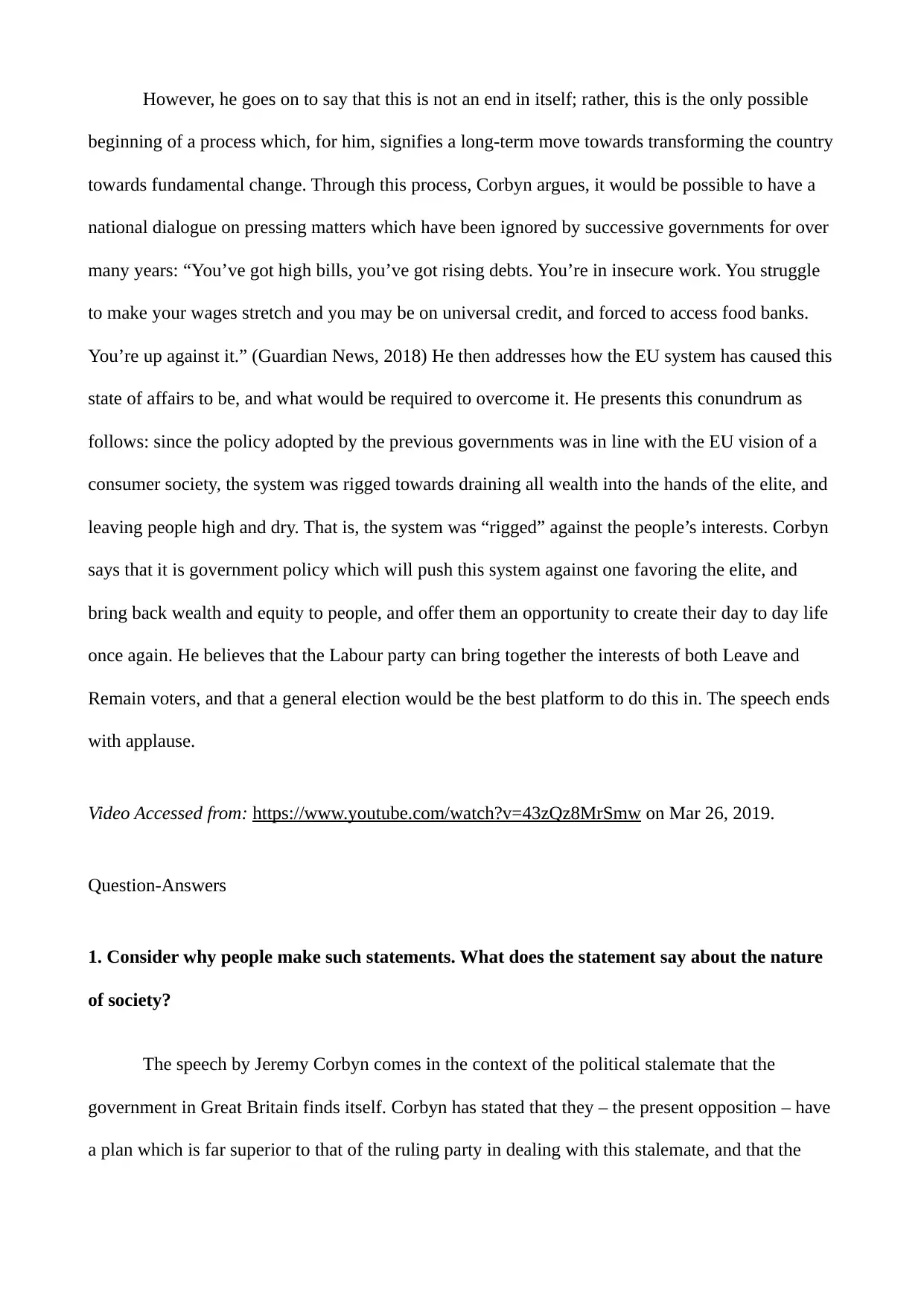
However, he goes on to say that this is not an end in itself; rather, this is the only possible
beginning of a process which, for him, signifies a long-term move towards transforming the country
towards fundamental change. Through this process, Corbyn argues, it would be possible to have a
national dialogue on pressing matters which have been ignored by successive governments for over
many years: “You’ve got high bills, you’ve got rising debts. You’re in insecure work. You struggle
to make your wages stretch and you may be on universal credit, and forced to access food banks.
You’re up against it.” (Guardian News, 2018) He then addresses how the EU system has caused this
state of affairs to be, and what would be required to overcome it. He presents this conundrum as
follows: since the policy adopted by the previous governments was in line with the EU vision of a
consumer society, the system was rigged towards draining all wealth into the hands of the elite, and
leaving people high and dry. That is, the system was “rigged” against the people’s interests. Corbyn
says that it is government policy which will push this system against one favoring the elite, and
bring back wealth and equity to people, and offer them an opportunity to create their day to day life
once again. He believes that the Labour party can bring together the interests of both Leave and
Remain voters, and that a general election would be the best platform to do this in. The speech ends
with applause.
Video Accessed from: https://www.youtube.com/watch?v=43zQz8MrSmw on Mar 26, 2019.
Question-Answers
1. Consider why people make such statements. What does the statement say about the nature
of society?
The speech by Jeremy Corbyn comes in the context of the political stalemate that the
government in Great Britain finds itself. Corbyn has stated that they – the present opposition – have
a plan which is far superior to that of the ruling party in dealing with this stalemate, and that the
beginning of a process which, for him, signifies a long-term move towards transforming the country
towards fundamental change. Through this process, Corbyn argues, it would be possible to have a
national dialogue on pressing matters which have been ignored by successive governments for over
many years: “You’ve got high bills, you’ve got rising debts. You’re in insecure work. You struggle
to make your wages stretch and you may be on universal credit, and forced to access food banks.
You’re up against it.” (Guardian News, 2018) He then addresses how the EU system has caused this
state of affairs to be, and what would be required to overcome it. He presents this conundrum as
follows: since the policy adopted by the previous governments was in line with the EU vision of a
consumer society, the system was rigged towards draining all wealth into the hands of the elite, and
leaving people high and dry. That is, the system was “rigged” against the people’s interests. Corbyn
says that it is government policy which will push this system against one favoring the elite, and
bring back wealth and equity to people, and offer them an opportunity to create their day to day life
once again. He believes that the Labour party can bring together the interests of both Leave and
Remain voters, and that a general election would be the best platform to do this in. The speech ends
with applause.
Video Accessed from: https://www.youtube.com/watch?v=43zQz8MrSmw on Mar 26, 2019.
Question-Answers
1. Consider why people make such statements. What does the statement say about the nature
of society?
The speech by Jeremy Corbyn comes in the context of the political stalemate that the
government in Great Britain finds itself. Corbyn has stated that they – the present opposition – have
a plan which is far superior to that of the ruling party in dealing with this stalemate, and that the
Paraphrase This Document
Need a fresh take? Get an instant paraphrase of this document with our AI Paraphraser
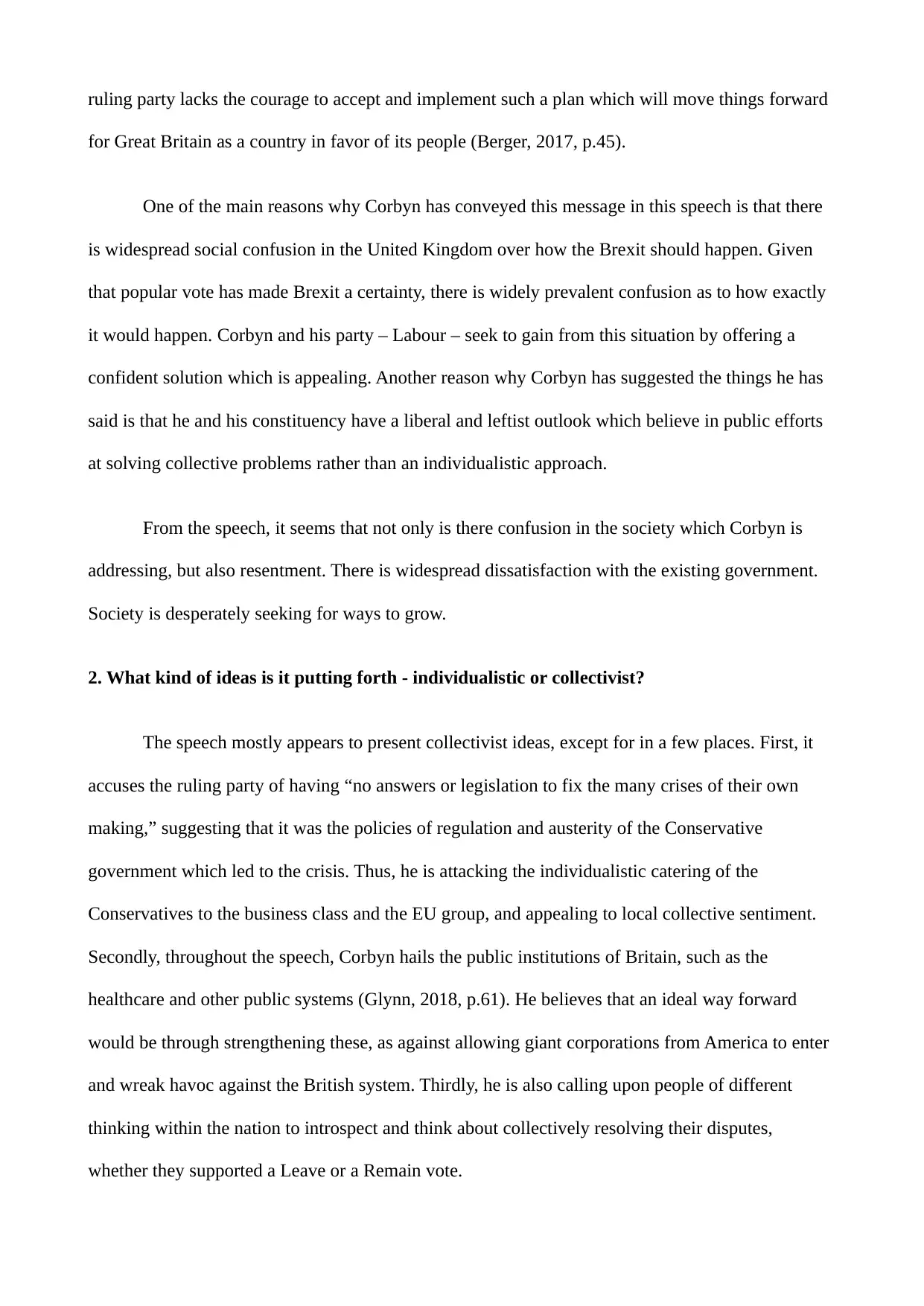
ruling party lacks the courage to accept and implement such a plan which will move things forward
for Great Britain as a country in favor of its people (Berger, 2017, p.45).
One of the main reasons why Corbyn has conveyed this message in this speech is that there
is widespread social confusion in the United Kingdom over how the Brexit should happen. Given
that popular vote has made Brexit a certainty, there is widely prevalent confusion as to how exactly
it would happen. Corbyn and his party – Labour – seek to gain from this situation by offering a
confident solution which is appealing. Another reason why Corbyn has suggested the things he has
said is that he and his constituency have a liberal and leftist outlook which believe in public efforts
at solving collective problems rather than an individualistic approach.
From the speech, it seems that not only is there confusion in the society which Corbyn is
addressing, but also resentment. There is widespread dissatisfaction with the existing government.
Society is desperately seeking for ways to grow.
2. What kind of ideas is it putting forth - individualistic or collectivist?
The speech mostly appears to present collectivist ideas, except for in a few places. First, it
accuses the ruling party of having “no answers or legislation to fix the many crises of their own
making,” suggesting that it was the policies of regulation and austerity of the Conservative
government which led to the crisis. Thus, he is attacking the individualistic catering of the
Conservatives to the business class and the EU group, and appealing to local collective sentiment.
Secondly, throughout the speech, Corbyn hails the public institutions of Britain, such as the
healthcare and other public systems (Glynn, 2018, p.61). He believes that an ideal way forward
would be through strengthening these, as against allowing giant corporations from America to enter
and wreak havoc against the British system. Thirdly, he is also calling upon people of different
thinking within the nation to introspect and think about collectively resolving their disputes,
whether they supported a Leave or a Remain vote.
for Great Britain as a country in favor of its people (Berger, 2017, p.45).
One of the main reasons why Corbyn has conveyed this message in this speech is that there
is widespread social confusion in the United Kingdom over how the Brexit should happen. Given
that popular vote has made Brexit a certainty, there is widely prevalent confusion as to how exactly
it would happen. Corbyn and his party – Labour – seek to gain from this situation by offering a
confident solution which is appealing. Another reason why Corbyn has suggested the things he has
said is that he and his constituency have a liberal and leftist outlook which believe in public efforts
at solving collective problems rather than an individualistic approach.
From the speech, it seems that not only is there confusion in the society which Corbyn is
addressing, but also resentment. There is widespread dissatisfaction with the existing government.
Society is desperately seeking for ways to grow.
2. What kind of ideas is it putting forth - individualistic or collectivist?
The speech mostly appears to present collectivist ideas, except for in a few places. First, it
accuses the ruling party of having “no answers or legislation to fix the many crises of their own
making,” suggesting that it was the policies of regulation and austerity of the Conservative
government which led to the crisis. Thus, he is attacking the individualistic catering of the
Conservatives to the business class and the EU group, and appealing to local collective sentiment.
Secondly, throughout the speech, Corbyn hails the public institutions of Britain, such as the
healthcare and other public systems (Glynn, 2018, p.61). He believes that an ideal way forward
would be through strengthening these, as against allowing giant corporations from America to enter
and wreak havoc against the British system. Thirdly, he is also calling upon people of different
thinking within the nation to introspect and think about collectively resolving their disputes,
whether they supported a Leave or a Remain vote.
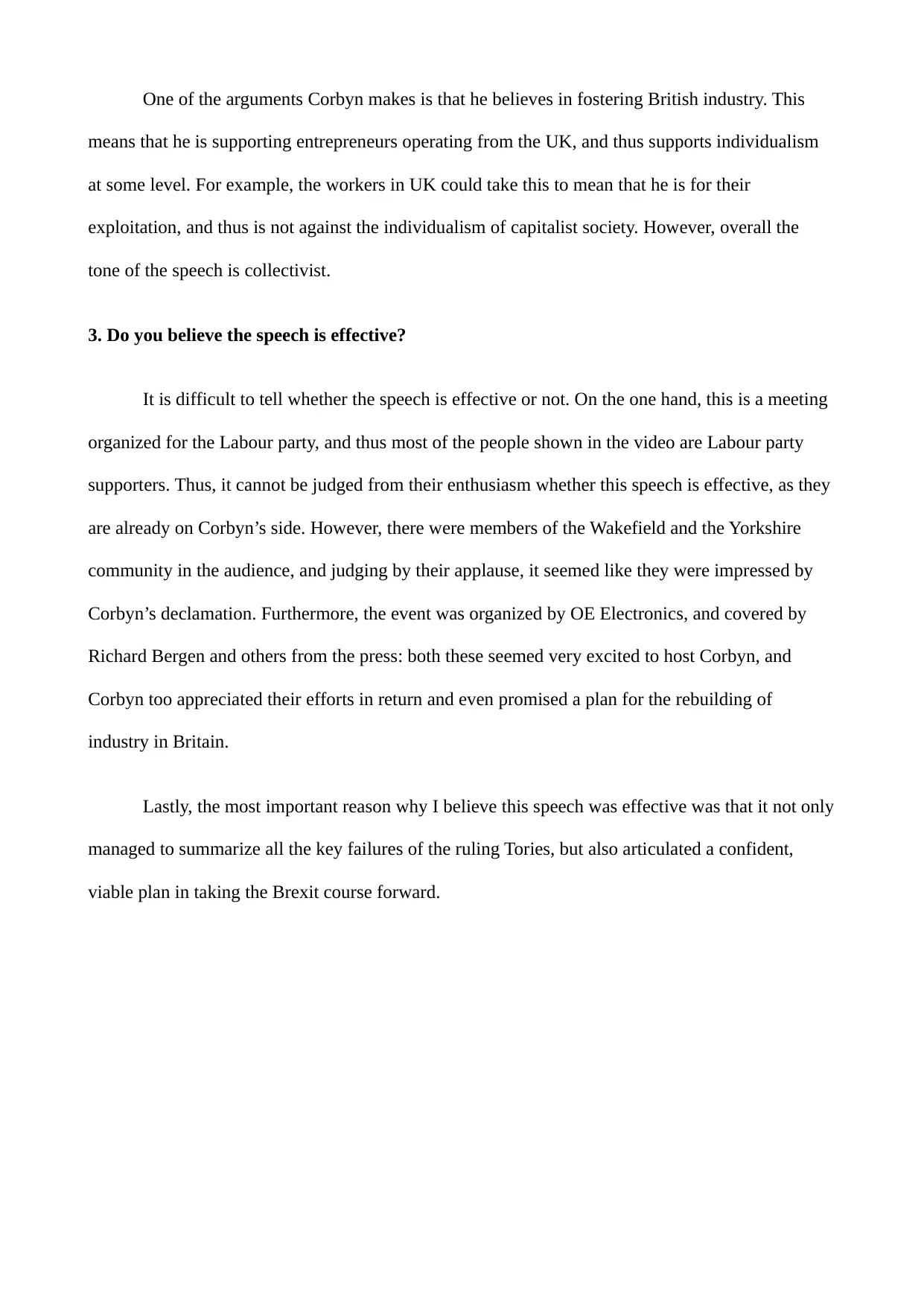
One of the arguments Corbyn makes is that he believes in fostering British industry. This
means that he is supporting entrepreneurs operating from the UK, and thus supports individualism
at some level. For example, the workers in UK could take this to mean that he is for their
exploitation, and thus is not against the individualism of capitalist society. However, overall the
tone of the speech is collectivist.
3. Do you believe the speech is effective?
It is difficult to tell whether the speech is effective or not. On the one hand, this is a meeting
organized for the Labour party, and thus most of the people shown in the video are Labour party
supporters. Thus, it cannot be judged from their enthusiasm whether this speech is effective, as they
are already on Corbyn’s side. However, there were members of the Wakefield and the Yorkshire
community in the audience, and judging by their applause, it seemed like they were impressed by
Corbyn’s declamation. Furthermore, the event was organized by OE Electronics, and covered by
Richard Bergen and others from the press: both these seemed very excited to host Corbyn, and
Corbyn too appreciated their efforts in return and even promised a plan for the rebuilding of
industry in Britain.
Lastly, the most important reason why I believe this speech was effective was that it not only
managed to summarize all the key failures of the ruling Tories, but also articulated a confident,
viable plan in taking the Brexit course forward.
means that he is supporting entrepreneurs operating from the UK, and thus supports individualism
at some level. For example, the workers in UK could take this to mean that he is for their
exploitation, and thus is not against the individualism of capitalist society. However, overall the
tone of the speech is collectivist.
3. Do you believe the speech is effective?
It is difficult to tell whether the speech is effective or not. On the one hand, this is a meeting
organized for the Labour party, and thus most of the people shown in the video are Labour party
supporters. Thus, it cannot be judged from their enthusiasm whether this speech is effective, as they
are already on Corbyn’s side. However, there were members of the Wakefield and the Yorkshire
community in the audience, and judging by their applause, it seemed like they were impressed by
Corbyn’s declamation. Furthermore, the event was organized by OE Electronics, and covered by
Richard Bergen and others from the press: both these seemed very excited to host Corbyn, and
Corbyn too appreciated their efforts in return and even promised a plan for the rebuilding of
industry in Britain.
Lastly, the most important reason why I believe this speech was effective was that it not only
managed to summarize all the key failures of the ruling Tories, but also articulated a confident,
viable plan in taking the Brexit course forward.
⊘ This is a preview!⊘
Do you want full access?
Subscribe today to unlock all pages.

Trusted by 1+ million students worldwide
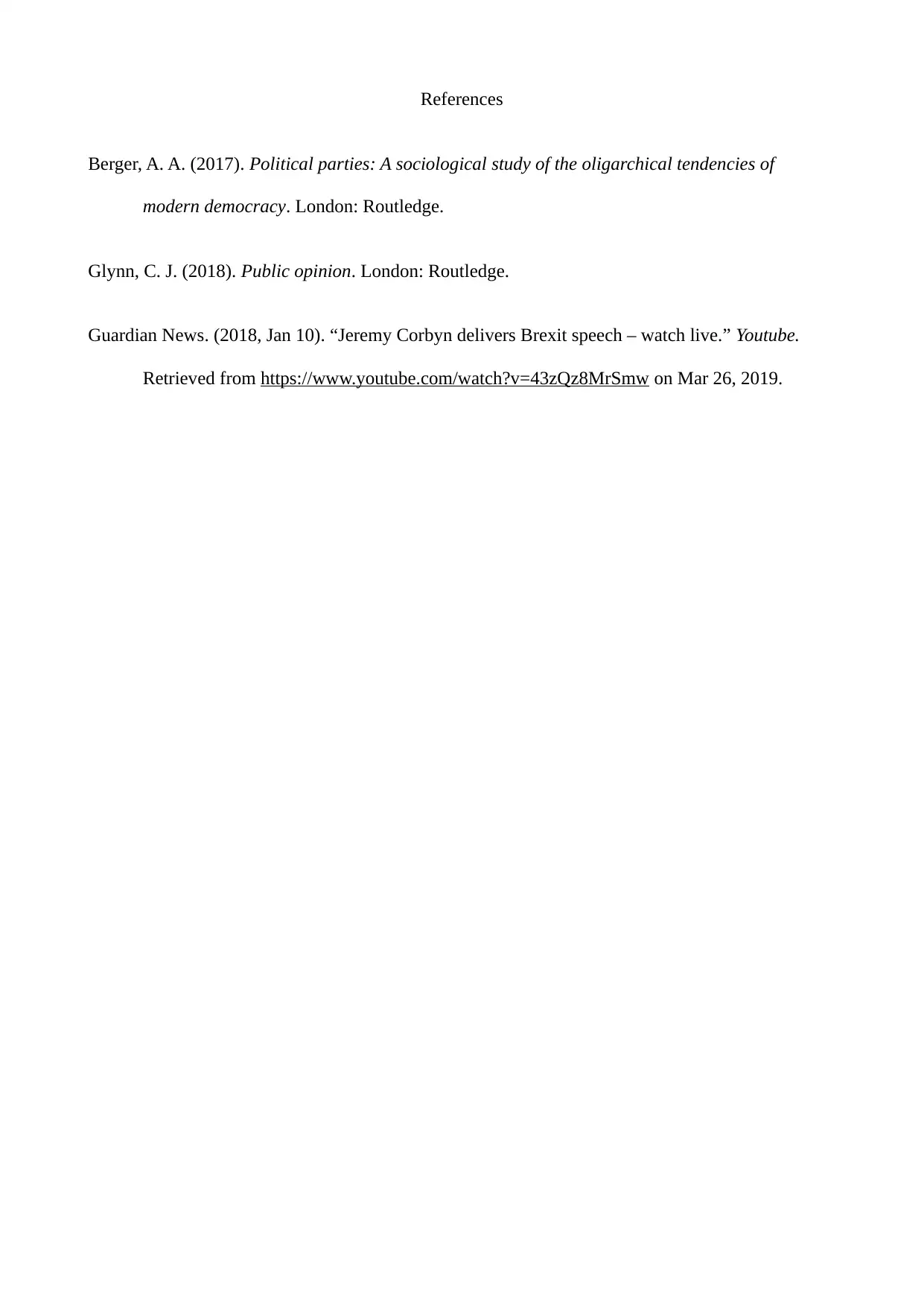
References
Berger, A. A. (2017). Political parties: A sociological study of the oligarchical tendencies of
modern democracy. London: Routledge.
Glynn, C. J. (2018). Public opinion. London: Routledge.
Guardian News. (2018, Jan 10). “Jeremy Corbyn delivers Brexit speech – watch live.” Youtube.
Retrieved from https://www.youtube.com/watch?v=43zQz8MrSmw on Mar 26, 2019.
Berger, A. A. (2017). Political parties: A sociological study of the oligarchical tendencies of
modern democracy. London: Routledge.
Glynn, C. J. (2018). Public opinion. London: Routledge.
Guardian News. (2018, Jan 10). “Jeremy Corbyn delivers Brexit speech – watch live.” Youtube.
Retrieved from https://www.youtube.com/watch?v=43zQz8MrSmw on Mar 26, 2019.
1 out of 7
Your All-in-One AI-Powered Toolkit for Academic Success.
+13062052269
info@desklib.com
Available 24*7 on WhatsApp / Email
![[object Object]](/_next/static/media/star-bottom.7253800d.svg)
Unlock your academic potential
Copyright © 2020–2025 A2Z Services. All Rights Reserved. Developed and managed by ZUCOL.